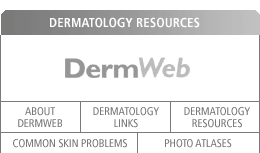|
|
 |
 |
 |
Your skin has many important functions that are associated with it being the largest organ of your body:
- The skin is your body's first defense against disease and infection, protecting you from bacteria, dirt and other foreign objects
- It protects your internal organs from injuries
- It regulates body temperature and plays an important role in regulating your body’s fluids – preventing fluid loss as well as helping your body remove excess water and salt
- Your skin protects you from the ultraviolet rays of the sun
- It contains the nerve endings that sense temperature and texture
Below the smooth, hairy outer skin, or epidermis, that we see every day is a thick, strong and elastic layer of tissue known as the dermis. The dermis is richly supplied with blood vessels, sweat and oil glands, and nerve endings.
Healthy skin is smooth, with no breaks in the surface. It is warm (not hot or red) and neither dry and flaky nor moist and wrinkled. Healthy skin is a mirror of a healthy body.
There are two main elements in a balanced program of caring for your skin: internal and external care.
INTERNAL CARE: Basic tips for maintaining healthy skin
Nutrition
To keep your skin healthy, eat a well balanced diet that includes plenty of protein foods, fresh fruits and vegetables and liquids. If you are having a skin problem, such as a pressure sore or a healing surgical incision, you should increase your intake of protein (lean meats, dairy foods and vegetables), carbohydrates (breads, cereals), vitamins A, C and E, and zinc. Extra iron may be needed if you are anaemic.
Circulation
The skin is served by a large number of blood vessels, and adequate circulation is needed to maintain skin health. You can help ensure a healthy blood supply to the skin by changing the following behaviours that can cause circulatory problems:
- Smoking - Nicotine in cigarettes causes blood vessels to constrict and prevents blood, oxygen and nutrients from flowing to the body tissues. Long-term smokers usually have more skin damage than a non-smoker, including exaggerated wrinkles and premature aging, all other risk factors being equal. Stop smoking today.
- Edema is a swelling caused by fluid collecting in the tissues and usually occurs in in areas furthest away from the heart. The skin over areas of edema can become thin and pale and injure easily because of poor circulation. Edema can be prevented by elevating your legs and hands frequently and regular exercise includes range of motion exercises.
- Anaemia is a decrease in red blood cells, which results in less oxygen getting to the skin as oxygen is carried by the red blood cells. This results in injury to or sores on the skin. Anaemia should be evaluated and treated by your family doctor.
- Vascular Disease is a narrowing of the blood vessels that can be caused by diabetes, smoking, high blood pressure or elevated cholesterol. The result of vascular disease is a decreased blood flow to the skin. By working with your physician you can manage the conditions that can lead to vascular disease and cause skin problems.
|
EXTERNAL CARE: Basic Tips for maintaining good skin care
- Avoid soaps labelled as antibacterial or antimicrobial, as these can change the skin's normal flora that acts to protect from infection. Normal flora is the bacteria which normally lives on skin and the balance of the flora is important in prevention of infection.
- Keep the skin clean and dry by washing daily with soap and water, rinsing and drying thoroughly.
- Avoid using items that may dry the skin like harsh soaps or lotions that are alcohol-based.
- Skin folds like creases in the groin area and underarms need washing more frequently as rashes can easily form in these areas because of the increased moisture and warmth. Increasing the air circulation to these areas can also help prevent.
- Lubricate dry skin with moisturizing creams or ointments, however use care when applying creams over bony areas as the lotions may soften the skin and promote skin breakdown. Moisturizers are best used immediately after bathing as they help to trap the moisture in the skin. Tapes, soaps, fabrics or other irritants can cause localized rashes, while total body rashes may result from allergies to foods or drugs. Avoid things which irritate your skin.
- Yeast growth may be supported by talcum powders, and so use powders sparingly. Talcum powders can cause skin breakdown by keeping moisture in when they cake up
- Dirty skin can break down easily, and if possible should be cleaned up immediately to prevent weakening and breakdown of the surface of the skin. Specifically, urine and stool have irritants in them, so you should clean your skin immediately after contact.
- Protect your skin from excessive exposure to the sun
| - |
Use a high SPF (30+) sunscreen with the Canadian Dermatology Association logo when going out into the sun, and apply it properly. Make sure to apply lotion 15 minutes before sun exposure, and re-apply as necessary (usually every 2 hours). |
| - |
Keep out of the sun during the hottest times of the day – 11 am to 3 pm. Not only is the sun the hottest during this time, but the ultraviolet rays are also the strongest. If you can limit your exposure during this time you will reduce the sun’s impact dramatically. |
| - |
Use protective clothing, such as large hats and UV protecting garments, and sunglasses that are UV coated. |
modified 011808 |
|
 |
|

